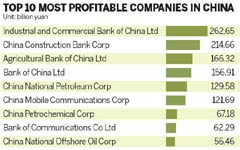More Chinese private companies than ever are finding a place in the Fortune 500 rankings that have been dominated by the big State-owned enterprises.
Of the 100 Chinese companies that are part of the latest ranking, 22 are those in which the government shareholding is less than 50 percent, three more than last year.
Although some of the companies, such as Ping An Insurance, ranked 122 on the list, are still partly owned by the government, the number has grown significantly from 2008, when Lenovo Group was the only private firm on the list.
 |
 |
The financial sector accounts for most of the private Chinese companies in the Fortune rankings, while technology, metal, energy, construction, textile and automobile industries also have their representatives.
The growing number of private companies in the list is also a sign of the booming private economy in China. Official data show that private companies have seen their profits grow by more than 20 percent in the past five years. Private companies also contributed to 60 percent of the nation's GDP and more than 90 percent of new employment.
However, despite the promising data, a glass ceiling still exists for private companies. For example, private companies still face many disadvantages when it comes to acquiring monetary and tax support. There are also monopolized sectors, where private companies cannot take a share, that fosters most of the big SOEs on the Fortune list.
In this year's government work report, Premier Li Keqiang has called for larger access for non-government capital in finance, oil, electricity, railway, telecom and resources industries. Such policies are expected to buoy private companies, but there is still a long way before they are actually implemented.
Fu Mengda contributed to this story.
